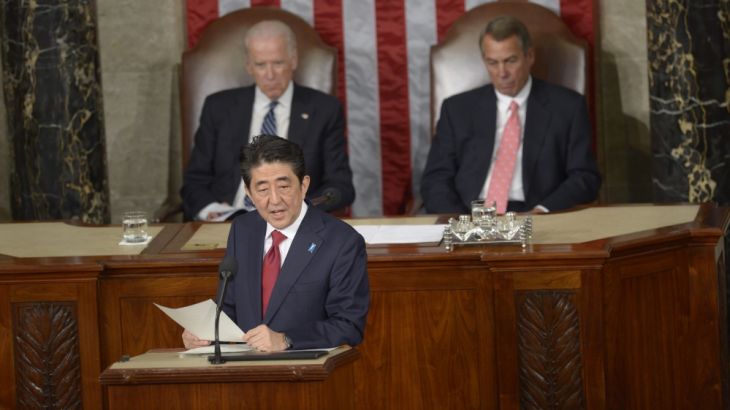Japan PM voices World War II ‘repentance’ in US speech
Shinzo Abe offers “eternal condolences to the souls of all American people that were lost during World War II”.

Japanese Prime Minister Shinzo Abe has expressed “deep repentance” over Japan’s role in World War II, in a landmark speech to the US Congress.
Abe, who is working with US President Barack Obama towards a major Pacific trade pact, told legislators on Wednesday that his country was holding “a new banner that is a ‘proactive contribution to peace based on the principle of international cooperation'”.
| Notes from the field |
 In his speech, Prime Minister Shinzo Abe acknowledged Japan’s past wartime actions stating: “History is harsh. What is done cannot be undone.” And he expressed his condolences to the American lives lost in World War II. He recognised the suffering Japan’s actions caused other Asian countries in the region. But, many were hopeful Abe would word his speech more strongly and apologise for Japan forcing tens of thousands of women into brothels to service Japanese soldiers.
Abe did not.
Instead, he stated that he “upheld the views expressed by previous prime ministers” who in the past have been more forthright and apologetic.
|
“On behalf of Japan and the Japanese people, I offer with profound respect my eternal condolences to the souls of all American people that were lost during World War II,” he said.
“History is harsh. What is done cannot be undone.”
The speech was aimed at helping Obama win over his fellow Democrats to support the 12-nation Trans-Pacific Partnership agreement that would further open vast Asian and Pacific rim markets to US exports.
Democrats oppose the deal as being bad for US jobs.
Al Jazeera’s Kimberly Halkett, reporting from Capitol Hill, reflected that Abe had made the speech at the very podium where in 1941, US President Franklin D Roosevelt came to congress to declare war on Japan following the attack on Pearl Harbor.
“So his speech really underscores just how much of a shift there has been in the Japanese-United States relationship in the decades that followed World War II,” said Halkett.
Abe also expressed his “deep remorse” over Japan’s actions towards neighbouring Asian nations, but stopped short of a full apology demanded by many.
The prime minister was faced in Congress with the presence of 87-year-old Lee Yong-Soo, one of the estimated 200,000 Asian women who were forced into sexual slavery by occupying Japanese troops.
She was invited by US politician Mike Honda who is one of many that accuse Abe of downplaying any official role in the slavery by the country or its military.
Honda said it was “shocking and shameful” that Abe “continues to evade his government’s responsibility for the systematic atrocity that was perpetrated by the Japanese Imperial Army”.
Obama had received Abe on Tuesday at the White House, saying he wanted to strengthen his country’s “indestructible” ties with Tokyo.
On Monday, Japanese and US foreign and defence ministers meeting in New York approved revisions to the US-Japan defence guidelines.
The new rules boost Japan’s military capability amid growing Chinese assertiveness in disputed areas in the East and South China Sea claimed by Beijing.
The changes, which strengthen Japan’s role in missile defence, mine sweeping and ship inspections, are the first revisions in 18 years to the rules that govern US-Japan defence cooperation.